How we did this
For this report on attitudes regarding the impeachment trial of President Donald Trump, we surveyed 12,638 U.S. adults in January 2020. Everyone who took part is a member of Pew Research Center’s American Trends Panel (ATP), an online survey panel that is recruited through national, random sampling of residential addresses. This way nearly all U.S. adults have a chance of selection. The survey is weighted to be representative of the U.S. adult population by gender, race, ethnicity, partisan affiliation, education and other categories. Read more about the ATP’s methodology and the methodology for this report.
As the Senate impeachment trial gets underway, slightly more Americans say that Donald Trump should be removed from office than say he should stay in office, with these views starkly divided along partisan lines.
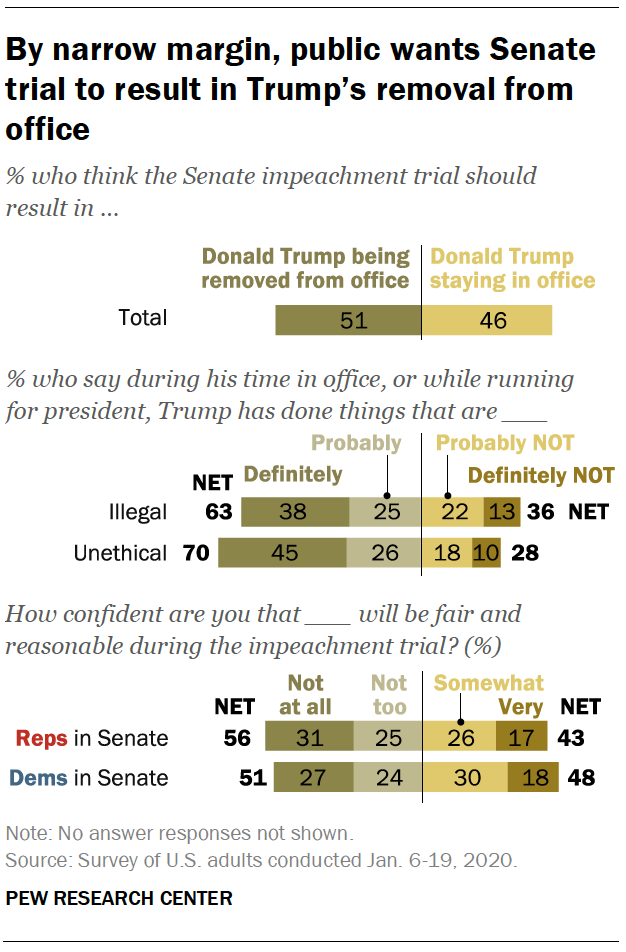
Roughly half of U.S. adults (51%) say the outcome of the Senate trial should be Trump’s removal from office, while 46% say the result should lead to Trump remaining in office. An overwhelming share of Republicans and Republican-leaning independents (86%) say the trial should result in Trump remaining in office, while roughly the same share of Democrats and Democratic leaners (85%) think Trump should be removed.
While the public’s preferences for the outcome of the Senate trial are closely divided, 63% of Americans say Trump has definitely (38%) or probably (25%) done things that are illegal, either during his time in office or while he was running for president. A larger majority (70%) say he has definitely (45%) or probably (26%) done unethical things, according to the new survey, conducted Jan. 6-19 among 12,638 U.S. adults on Pew Research Center’s American Trends Panel.
As was the case in public views of the House’s impeachment inquiry in the fall, the public does not express much confidence in either party to be “fair and reasonable” during the Senate trial. About half of Americans (48%) are at least somewhat confident that Senate Democrats will be fair and reasonable, while slightly fewer (43%) say the same about the Senate GOP. Most partisans say they are confident senators of their party will behave fairly and reasonably, while also expecting that those in the other party will not.
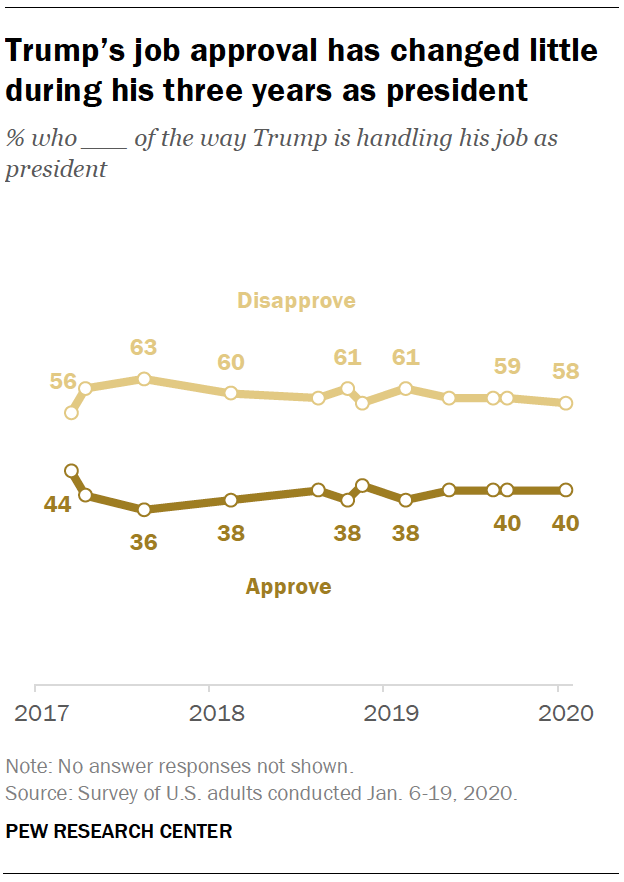
Trump’s overall job ratings have not changed in the wake of the impeachment process, just as they have remained relatively stable over the course of his presidency. In the current survey, 40% approve of the way Trump is handling his job as president, while 58% say they disapprove. Views are about the same as they were in September 2019 (40% approve, 59% disapprove), prior to the House of Representatives launching a formal impeachment inquiry and voting to impeach the president.
Should the Senate vote to remove Trump?
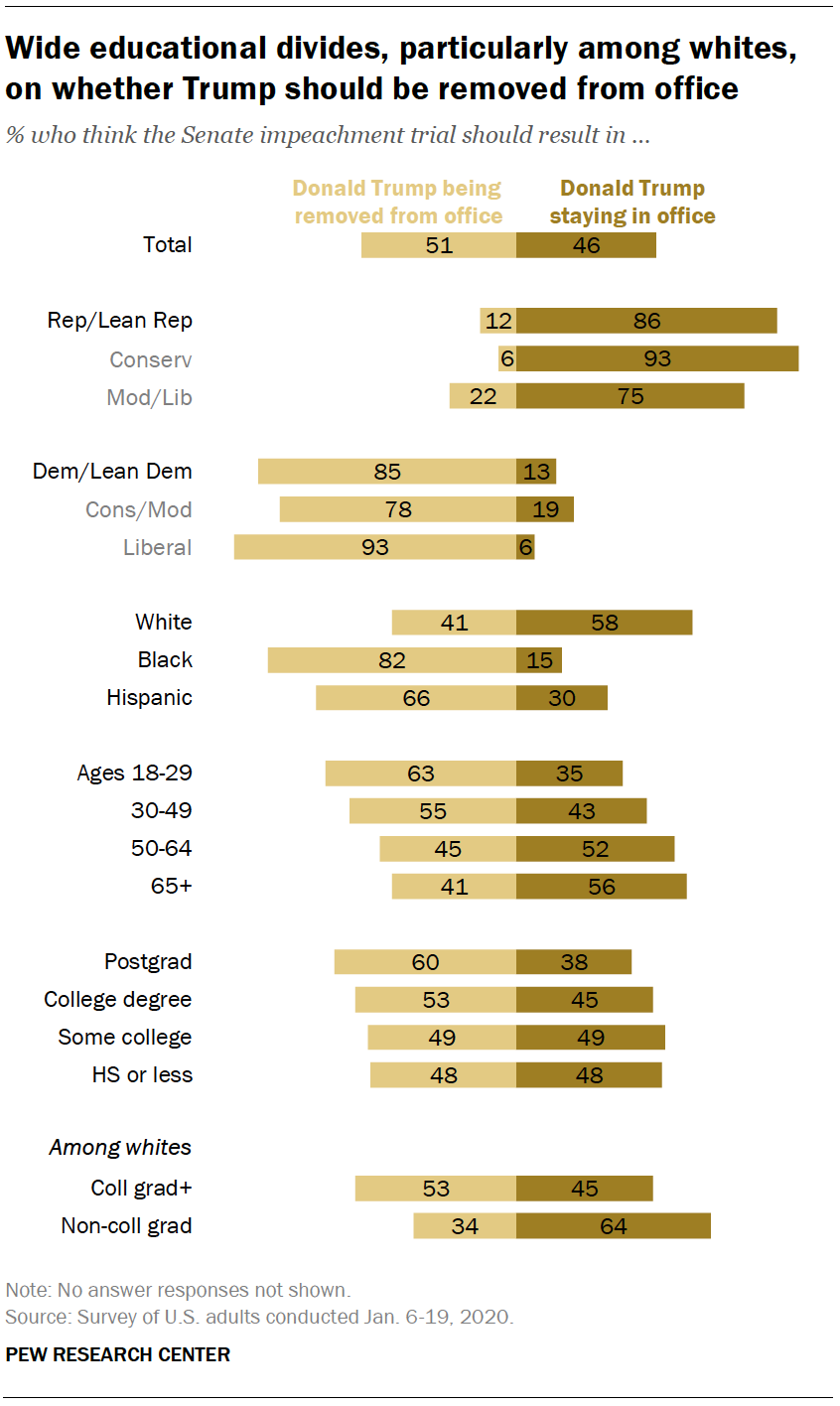
Opinions about what the outcome of the trial should be are sharply divided along party lines. More than eight-in-ten Republicans and Republican-leaning independents (86%) say that the Senate trial should result in Trump staying in office. By contrast, a nearly identical share of Democrats and Democratic leaners (85%) say the trial should result in Trump’s removal.
And while a 56% majority of Americans ages 65 and older say Trump should remain in office, 63% of those under 30 say the trial should lead to Trump’s removal.
To some extent this age divide reflects that younger adults tend to be more Democratic than older adults, but younger Americans are more likely to say this even after accounting for partisanship.
Among Republicans, just 7% of those 50 and older say Trump should be removed from office. By comparison, 26% of Republicans ages 18 to 29 and 16% of those 30 to 49 say the outcome of the Senate trial should result in Trump’s removal from office. There are no age differences in these views among Democrats: Roughly 85% of those in all age groups say the outcome of the Senate trial should be Trump’s removal.
Clear majorities of both black (82%) and Hispanic (66%) Americans say the Senate trial should result in Trump’s removal, while 58% of white Americans say the Senate should not remove Trump.
There is a stark difference in these views by education, particularly among white Americans. Nearly two-thirds of white Americans without a college degree (64%) say Trump should remain in office following the Senate trial. But the balance of opinion is reversed among white Americans with a college degree or more education: 53% say the outcome of the Senate trial should be that Trump is removed from office.
Majorities of Americans say it is likely that Trump has acted illegally or unethically
About six-in-ten Americans (63%) think that Donald Trump has probably or definitely done things that are illegal either during the 2016 election campaign or during his time in office. Slightly more (70%) say he has probably or definitely done things that are unethical.
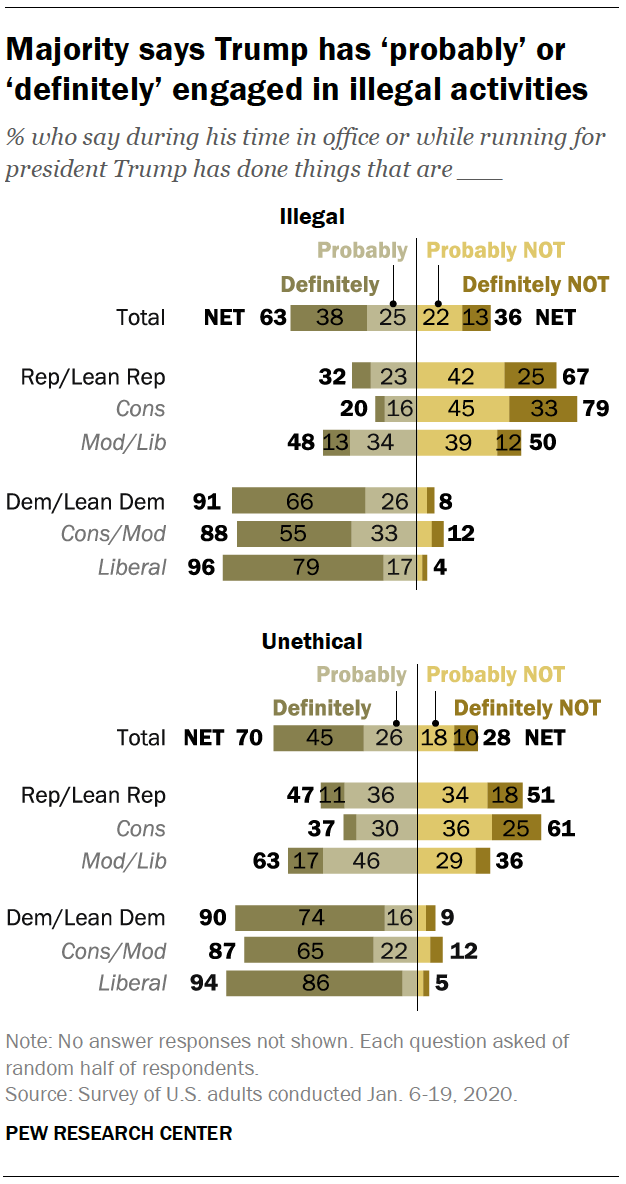
More than nine-in-ten Democrats (91%) and about one-third (32%) of Republicans say he has definitely or probably done illegal things, while 90% of Democrats and 47% of Republicans say he has definitely or probably done things that are unethical.
About two-thirds of Democrats (66%) express certainty that Trump has done things that are illegal, including 79% of liberal Democrats and 55% of moderate and conservative Democrats.
Republicans are much less likely than Democrats to say that Trump has definitely done illegal things, with only 8% saying this. However, an additional 23% say he has probably done illegal things.
About half of moderate and liberal Republicans (48%) say that Trump has probably or definitely done things that are illegal (moderates and liberals make up about one-third of Republicans and Republican leaners). Just 20% of conservative Republicans say this.
The proportion of Democrats saying Trump has probably or definitely done unethical things (90%) is nearly identical to the proportion saying he has done illegal things (91%). Among Republicans, more say that Trump has probably or definitely acted unethically (47%) than say he has probably or definitely acted illegally (32%).
Republicans are only slightly more likely to say that Donald Trump probably or definitely has not done unethical things (51%) than they are to say that he probably or definitely has done these things (47%). About six-in-ten moderate and liberal Republicans (63%) and 37% of conservative Republicans say that Trump has probably or definitely done things that are unethical.
Among GOP, views of whether Trump has behaved illegally or unethically are associated with opinions on removal
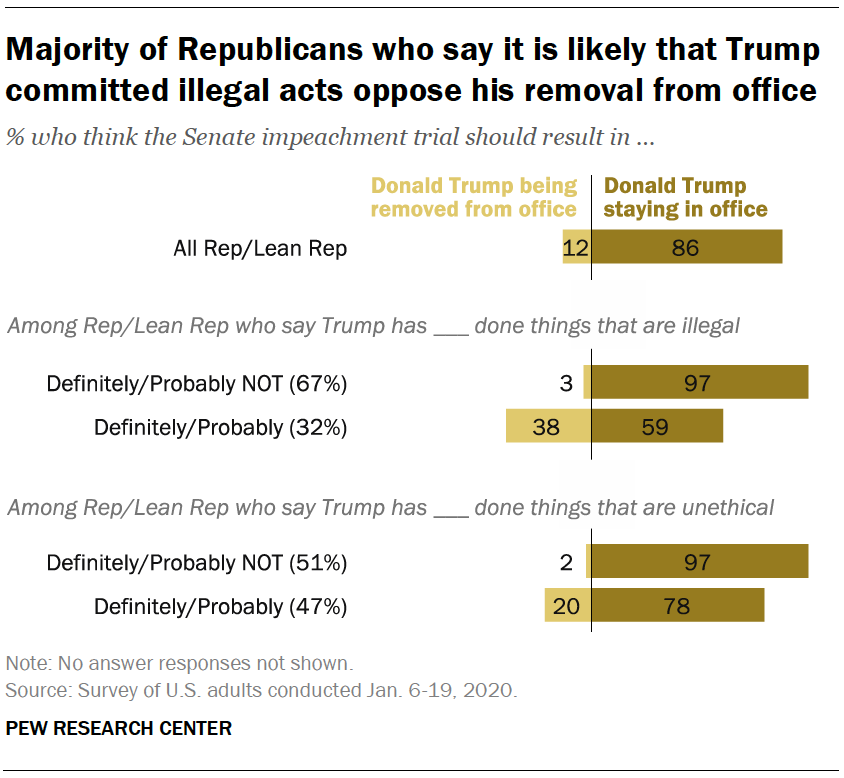
Among the two-thirds of Republicans who say Trump has definitely or probably not done things that are illegal, nearly all (97%) say that he should remain in office following the Senate trial. While a majority of the 32% of Republicans who say Trump has likely done illegal things either during the campaign or while in office also say he should remain in office (59%), about four-in-ten (38%) say the president should be removed from office.
Partisans express little or no confidence in the senators on the other side of the aisle to be ‘fair and reasonable’ during impeachment trial
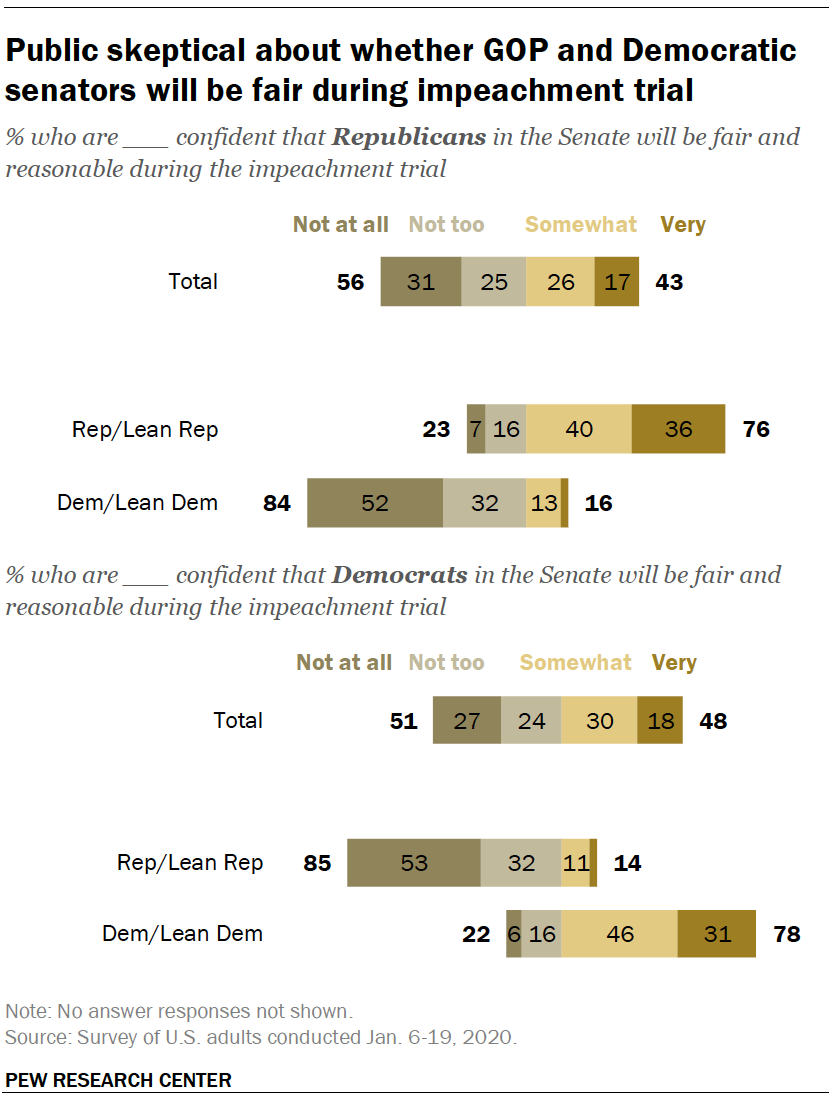
About four-in-ten (43%) say that Republicans in the Senate will be at least somewhat fair and reasonable during the trial, with just 17% saying they are very confident GOP senators will do this. Slightly more (48%) expect Democratic senators to be at least somewhat fair, though just 18% say they are very confident in this. (Note that much of this survey was fielded before the beginning of the trial and the release of the Senate rules.)
Opinions about the behavior of senators during the trial are similar to views about how House Republicans and Democrats would conduct themselves during the impeachment inquiry in a survey conducted in October.
As in October, these views largely fall along partisan lines. Most Republicans and Republican leaners (76%) say they are at least somewhat confident in Senate Republicans to be fair. By contrast, 85% of Republicans express little or no confidence in Democrats in the Senate – with 53% saying they are not at all confident.
Among Democrats and Democratic leaners, 78% are at least somewhat confident in Democrats to be fair during the trial, while 84% have little or no confidence in Senate Republicans – including 52% who express no confidence at all.
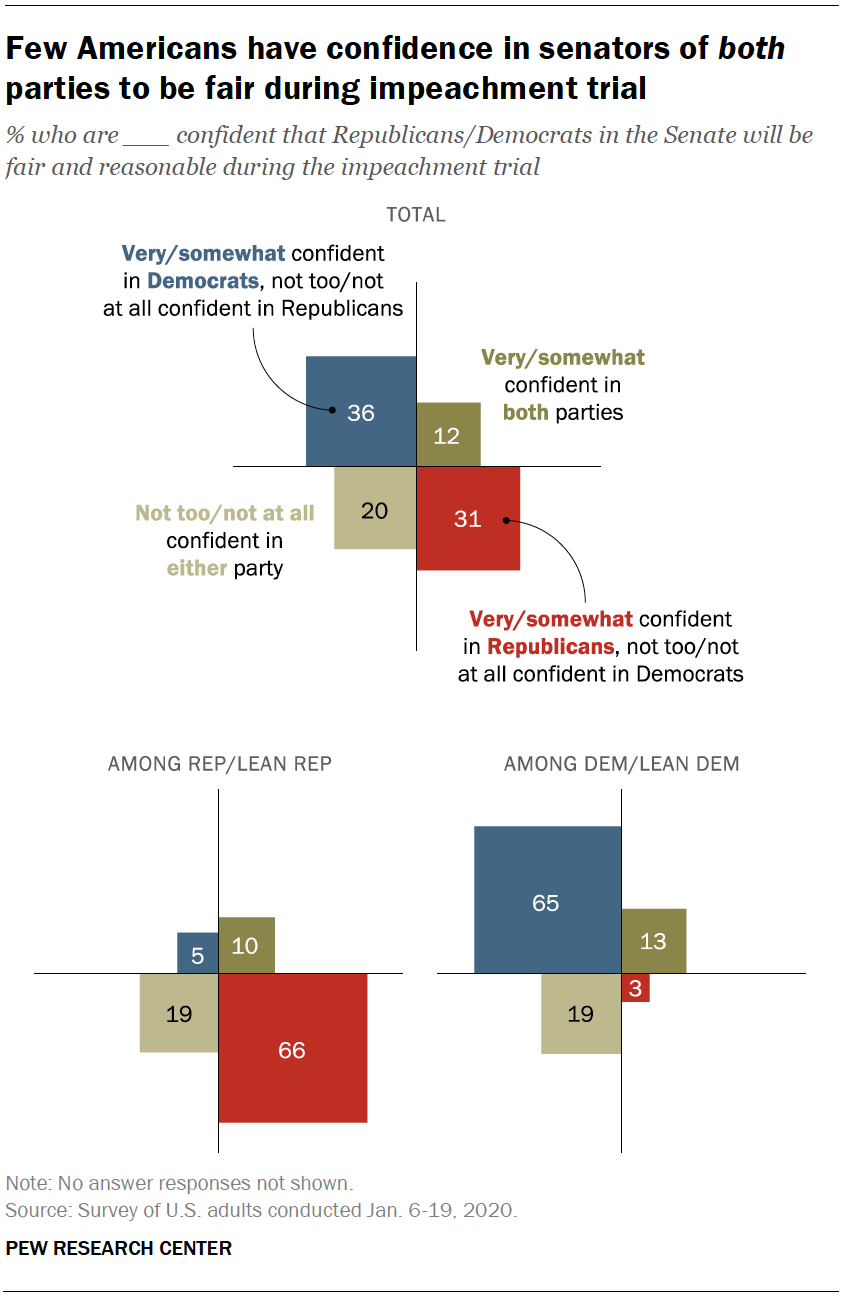
Only about one-in-ten (12%) Americans express at least some confidence that both parties will act fairly. About three-in-ten (31%) express confidence in Republican senators, but not confidence in Democrats and 36% are confident in Democrats, but not Republicans. One-in-five Americans (20%) are not too confident or not at all confident that either Republicans or Democrats will act fairly and reasonably during the impeachment trial.
Roughly two-thirds of both Republicans (66%) and Democrats (65%) express confidence in senators of their own party but not the other.
Views of Trump
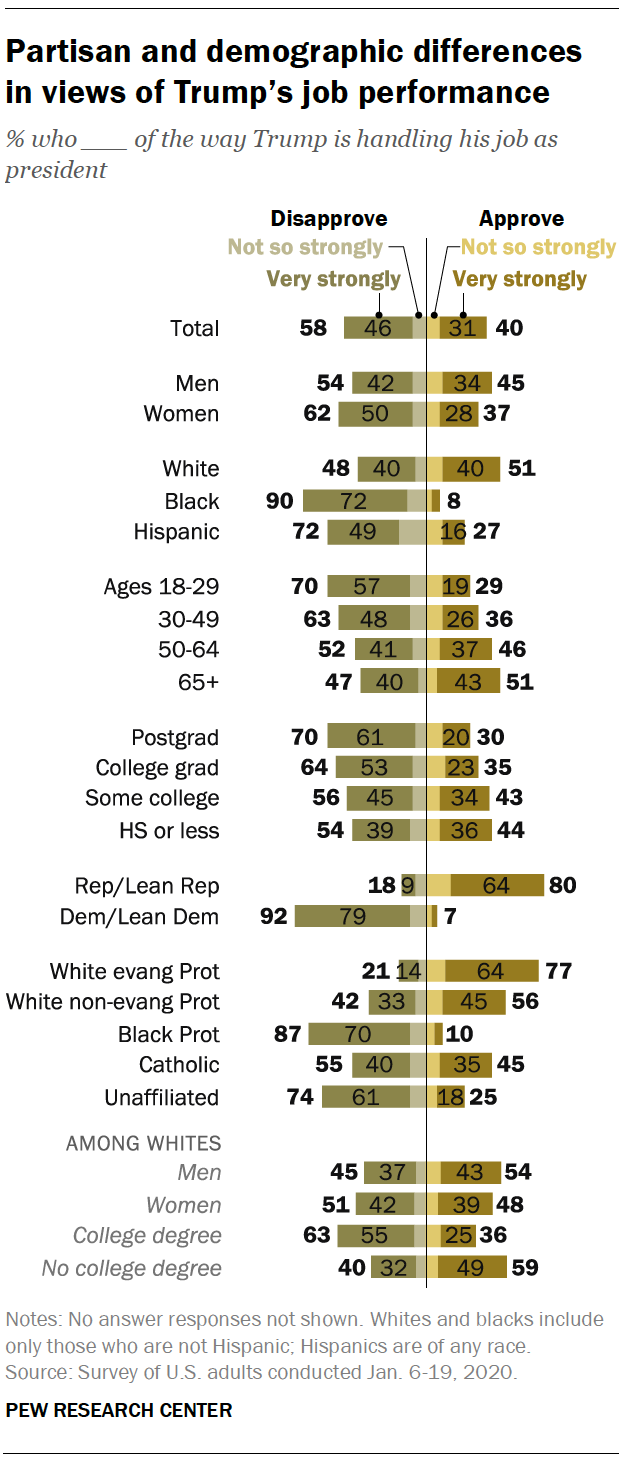
There are familiar partisan and demographic differences in assessments of Trump’s overall job performance.
Men, whites, older adults and those with lower levels of education continue to have more positive assessments of the president’s job performance than women, black and Hispanic adults, younger adults and those with higher levels of education.
About nine-in-ten Democrats and Democratic leaners (92%) disapprove of the way the president is handling his job, including 79% who say they disapprove very strongly. By contrast, 80% of Republicans and Republican leaners say they approve of Trump’s job performance (64% approve very strongly).
As with Trump’s overall job approval rating, public views of Trump’s ability to handle key aspects of his job have not changed substantially in recent months.
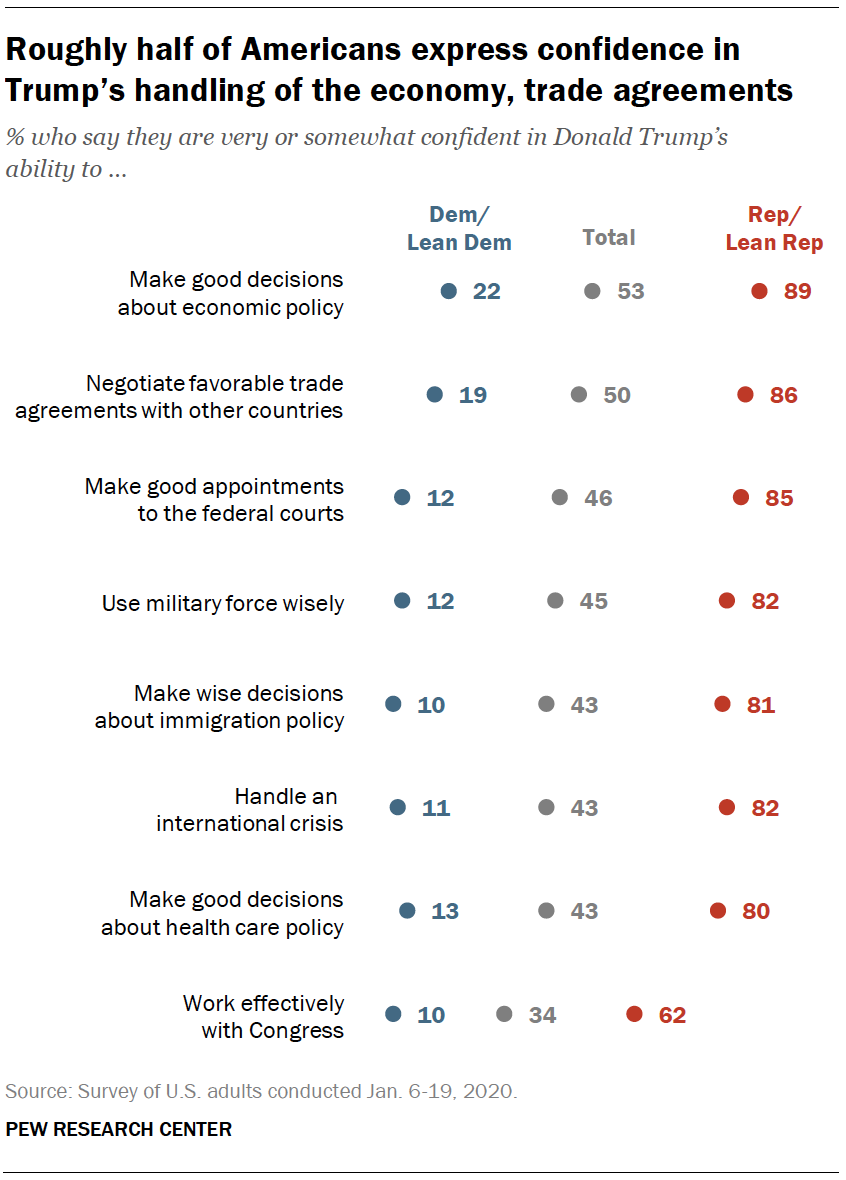
Overall, 53% say they are very or somewhat confident in Trump to make good decisions about economic policy. Half say they are confident in Trump to negotiate favorable trade agreements with other countries. Ratings of Trump in these areas were almost identical last August.
As in the past, Trump receives lower ratings in areas outside of the economy and trade. For instance, 43% say they have confidence in Trump to make good decisions about health care policy; a larger share (57%) say they are not too or not at all confident in Trump to do this. Similarly, more say they are not too or not at all confident in Trump to make wise decisions about immigration policy than say they are very or somewhat confident in his ability to do this (57% vs. 43%).
Views of Trump’s ability to use military force wisely – measured shortly after the Jan. 3 U.S. airstrike that killed Iranian Gen. Qassem Soleimani – are similar to those in August 2019. In the current survey, 45% say they are very or somewhat confident in Trump to use military force wisely, compared with 55% who say they are not too or not at all confident. Last August, 44% said they had confidence in Trump to handle this aspect of his job.
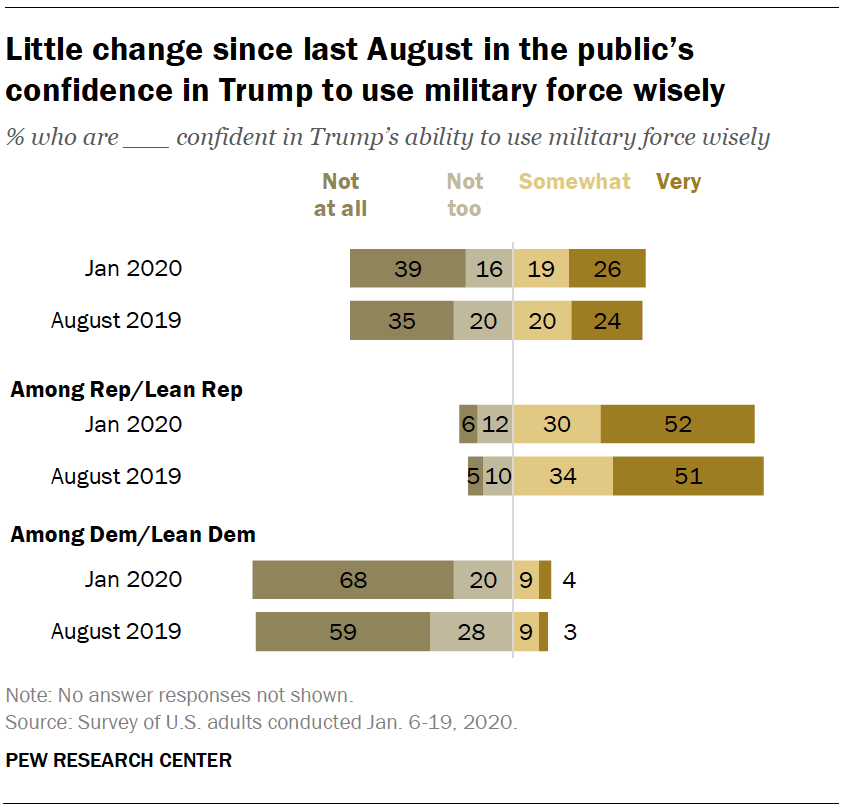
Democrats and Democratic leaners are 9 points more likely than last summer to say they are “not at all” confident in Trump to make wise decisions about the use of military force (68% today, compared with 59% last August). However, the combined share who say they are not too or not at all confident in Trump on this measure is about the same as it was last summer.
Among Republicans and Republicans leaners, 82% are very or somewhat confident in Trump to make wise decisions about the use of military force; views are little changed from August 2019.
For more on views of the U.S. airstrike that killed Iranian Gen. Qassem Soleimani, see: “Majority of U.S. Public Says Trump’s Approach on Iran Has Raised Chances of a Major Conflict.”
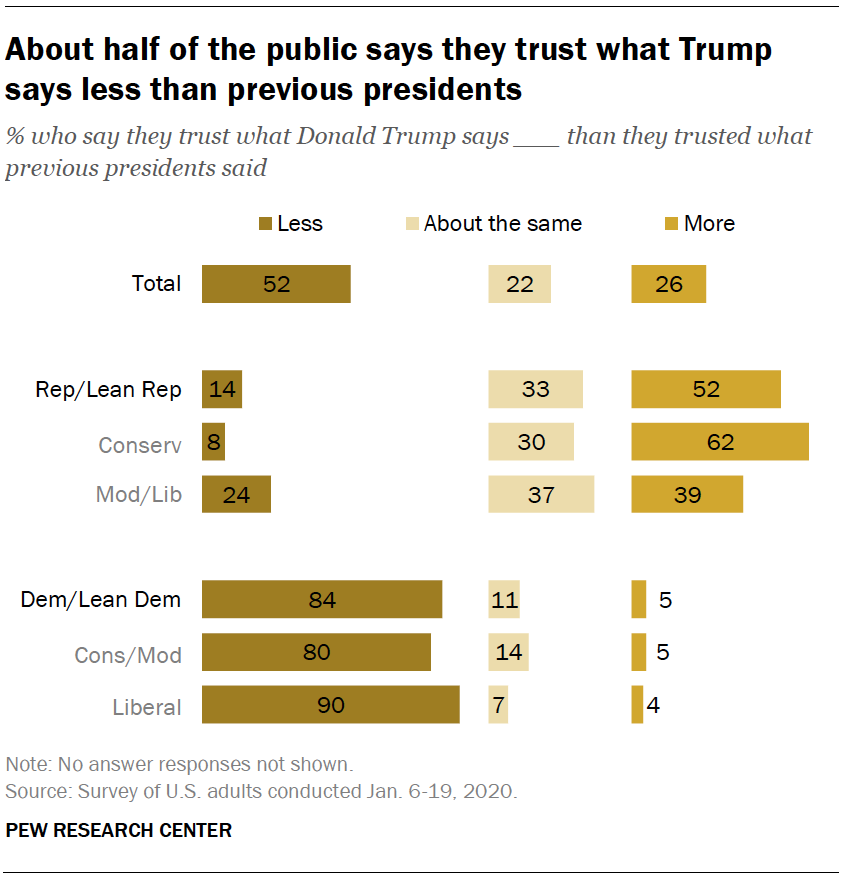
Overall, 52% say they trust what Trump says less than what previous presidents said while in office; 26% say they trust what Trump says more and 22% say they trust what he says about the same as they trusted what previous presidents said.
A large majority of Democrats and Democratic leaners (84%) trust what Trump says less then they trusted what previous presidents said while in office.
Views among Republicans and Republican leaners are more mixed: 52% say they trust what Trump says more than previous presidents, compared with 33% who trust what he says about the same as what previous presidents said and 14% who say they trust what he says less. Conservative Republicans (62%) are much more likely than moderate and liberal Republicans (39%) to say they trust what Trump says more than previous presidents.




